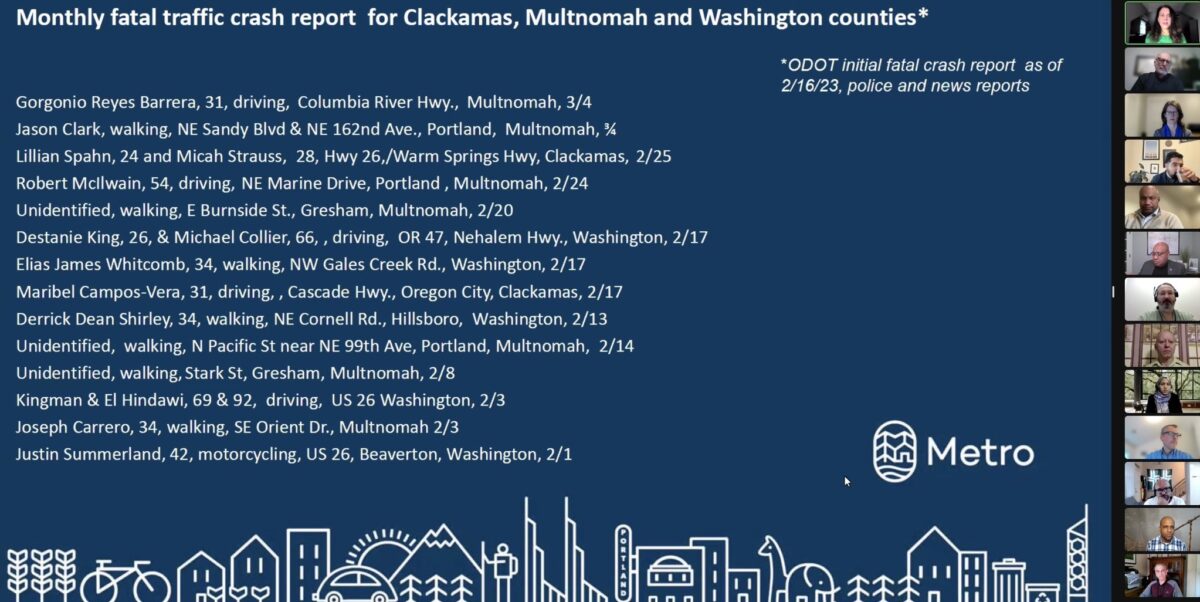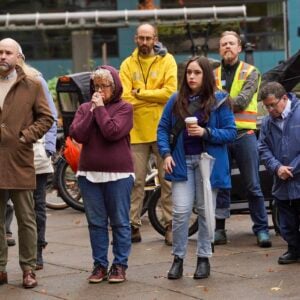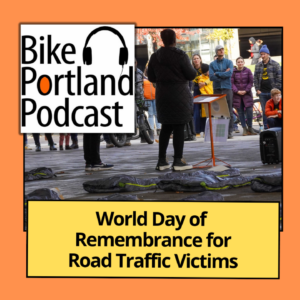Ever been to a transportation-related government committee meeting where someone reads the names of recent traffic victims? It’s a practice that has become more common in Portland in recent years as agencies have adopted Vision Zero campaigns.
I’m at meetings where this happens relatively often. It’s done at the outset of a meeting and I find it a powerful and somber reminder of what we’re fighting for and why making roads safer is so urgent. It’s often followed by a moment of silence.
When the names were read out loud at Metro’s March 16th Joint Policy Advisory Committee on Transportation (JPACT) meeting, it spurred a notable exchange between a Metro councilor, a Metro staffer and commissioners from Washington and Clackamas counties. As I watched and listened to the meeting, it made me realize that this reading of the names has even more value than I’d previously thought.
In this short podcast episode, you’ll hear the audio clips from the meeting along with my commentary interspersed between them.

What I found notable was how Washington County Commissioner Nafisa Fai used the reading as an opportunity to ask Metro about their road safety work. And in doing so, she spurred not just a quality dialogue with Metro Deputy Director Margi Bradway, but also an eyebrow-raising response from Clackamas County Commissioner Paul Savas. Savas chimed in by saying he was in alignment with Fai (“I actually appreciate what Commissioner Fai is trying to tease out and identify,” he said) and then shared how he feels we shouldn’t just blame road design because, “sometimes people are careless, and it’s unfortunate if it cost their lives and also the impacts to the people driving their cars as well.”
After Commissioner Savas’ response — which tiptoed a very fine line around straight-up victim-blaming — there was an awkward pause from JPACT Chair and Metro Councilor Juan Carlos Gonzalez. And then Commissioner Fai responded with, “I’m not sure I was teasing that out.”
It was an entertaining exchange. Beyond the Savas part, it shows how reading the names of road traffic victims at the outset of meetings like this can actually have a lot more value than you might think.
The BikePortland is a production of Pedaltown Media, Inc. If you liked this episode, subscribe and browse our archives for past shows, leave us a review on Apple Podcasts, and tell your friends about it. BikePortland is a community media source that relies on individual subscribers to stay in business. Please sign up today if you aren’t a subscriber already.
Listen in the player above or wherever you get your podcasts.








Thanks for reading.
BikePortland has served this community with independent community journalism since 2005. We rely on subscriptions from readers like you to survive. Your financial support is vital in keeping this valuable resource alive and well.
Please subscribe today to strengthen and expand our work.
Now we just need the agencies to release the facts of what happened instead of waiting a couple of years.
“There are three deaths. The first is when the body ceases to function. The second is when the body is consigned to the grave. The third is that moment, sometime in the future, when your name is spoken for the last time.”
― David M. Eagleman, Sum: Forty Tales from the Afterlives
Keep speaking their names…
Just don’t ambush politicians at restaurants and demand “Say their names”.
I appreciate direct statements. Reading names of victims goes to the heart of traffic safety discussions.
To me this is another facet of the whole subject of traffic safety communication, such as police reports. Using straightforward, direct language describing what people did and what the consequences were is much better than descriptions that hide those things, and/or make it sound like a series of actions that took place between vehicles or modes of travel, without human involvement or consequence.
Reading names jolts people out of the abstract and impersonal.
Well, I’d prefer pragmatic actions instead of performative actions. In my opinion, this seems akin to the land acknowledgment recitations. People use it as a way to absolve their guilt and then it’s back to “business as usual”.
Here is my take on what this allows in ideologically driven Portland:
I said “their names” so now I can still be against police traffic enforcement and allow people to drive recklessly because this is what is needed in order to reach my my misguided racial justice goals.
Let’s actually work toward Vision Zero and use all the tools in our toolbox, not just ones that line up with our personal ideology.
Hi Shane,
The whole reason I did this was because in this specific case it led to more than just a performative action. The reading spurred an actual exchange that got new ideas and details into the record and it forced Metro and everyone at the meeting to think about the issue a lot more than they would have otherwise done so.